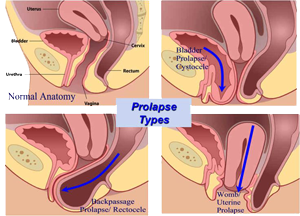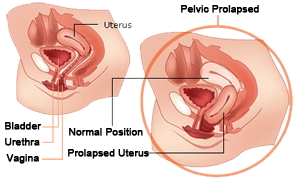What is pelvic organ prolapse ? |
| |
Pelvic organ prolapse occurs when a pelvic organ-such as your bladder-drops (prolapses) from its normal spot in your lower belly and pushes against the walls of your vagina. This can happen when the muscles that hold your pelvic organs in place get weak or stretched from childbirth or surgery. Many women will have some kind of pelvic organ prolapse. It can be uncomfortable or painful. But it isn't usually a big health problem. It doesn't always get worse. And in some women, it can get better with time. |
 |
| |
More than one pelvic organ can prolapse at the same time. Organs that can be involved when you have pelvic prolapse include the : |
- Bladder . This is the most common kind of pelvic organ prolapse.
- Urethra .
- Uterus .
- Vagina .
- Small bowel .
- Rectum .
|
|
| |
| |
What are the symptoms ? |
| |
Symptoms of pelvic organ prolapse include : |
- Feeling pressure from pelvic organs pressing against the vaginal wall. This is the most common symptom.
- Feeling very full in your lower belly.
- Feeling as if something is falling out of your vagina.
- Feeling a pull or stretch in your groin area or pain in your lower back.
- Releasing urine without meaning to (incontinence), or needing to urinate a lot.
- Having pain in your vagina during sex.
- Having problems with your bowels, such as constipation.
|
 |
|
| |
| |